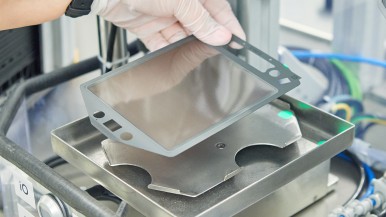Cologne / Stuttgart, Germany – Preventing the theft of expensive medical equipment, stopping unauthorized persons from entering restricted areas, and informing the OR of a rescue helicopter’s arrival: with the help of intelligently connected cameras, video technology, and much more, things that used to be impossible at hospitals – or were only possible as stand-alone, non-digital solutions – are now child’s play thanks to Bosch’s internet of things (IoT) expertise. According to the insurance industry, the theft of endoscopic devices results in millions of euros in damages for hospital operators throughout Europe. Sensor-based video technology in corridors and at points of entry and exit can provide crucial evidence for prosecuting criminals. Prevention is equally important. Intelligently controlled lighting, connected motion detectors on doors and windows, and intrusion alarm systems scare off burglars, prevent theft, and save operators the high cost of having to replace expensive medical equipment. “The internet of things has finally arrived at hospitals,” Dr. Stefan Hartung, the member of the board of management responsible for the Energy and Building Technology business sector at Bosch, said at a press conference. Safety and security are not the only benefits, he added: connected solutions also provide greater convenience and efficiency in hospitals. Bosch plans to generate sales of around 100 million euros with smart hospital projects in the years ahead. For the entire Energy and Building Technology business sector, Bosch expects sales growth of around five percent this year, more than double the sector’s growth rate last year.
About Bosch
The Bosch Group is a leading global supplier of technology and services. It employs roughly 417,900 associates worldwide (as of December 31, 2024). According to preliminary figures, the company generated sales of 90.5 billion euros in 2024. Its operations are divided into four business sectors: Mobility, Industrial Technology, Consumer Goods, and Energy and Building Technology. With its business activities, the company aims to use technology to help shape universal trends such as automation, electrification, digitalization, connectivity, and an orientation to sustainability. In this context, Bosch’s broad diversification across regions and industries strengthens its innovativeness and robustness. Bosch uses its proven expertise in sensor technology, software, and services to offer customers cross-domain solutions from a single source. It also applies its expertise in connectivity and artificial intelligence in order to develop and manufacture user-friendly, sustainable products. With technology that is “Invented for life,” Bosch wants to help improve quality of life and conserve natural resources. The Bosch Group comprises Robert Bosch GmbH and its roughly 470 subsidiary and regional companies in over 60 countries. Including sales and service partners, Bosch’s global manufacturing, engineering, and sales network covers nearly every country in the world. Bosch’s innovative strength is key to the company’s further development. At 136 locations across the globe, Bosch employs some 86,900 associates in research and development, of which nearly 48,000 are software engineers.
The company was set up in Stuttgart in 1886 by Robert Bosch (1861–1942) as “Workshop for Precision Mechanics and Electrical Engineering.” The special ownership structure of Robert Bosch GmbH guarantees the entrepreneurial freedom of the Bosch Group, making it possible for the company to plan over the long term and to undertake significant upfront investments in the safeguarding of its future. Ninety-four percent of the share capital of Robert Bosch GmbH is held by Robert Bosch Stiftung GmbH, a charitable foundation. The remaining shares are held by Robert Bosch GmbH and by a corporation owned by the Bosch family. The majority of voting rights are held by Robert Bosch Industrietreuhand KG. It is entrusted with the task of safeguarding the company’s long-term existence and in particular its financial independence – in line with the mission handed down in the will of the company’s founder, Robert Bosch.
Additional information is available online at www.bosch.com, www.iot.bosch.com, www.bosch-press.com.



